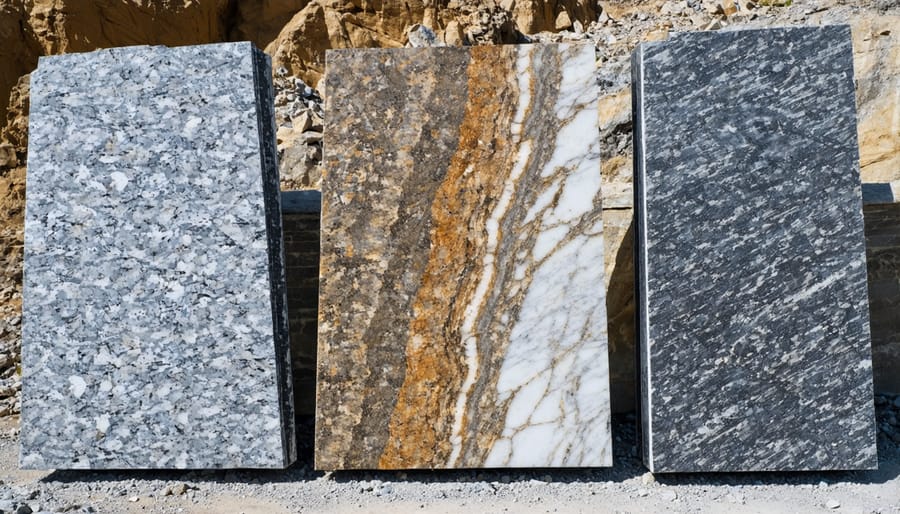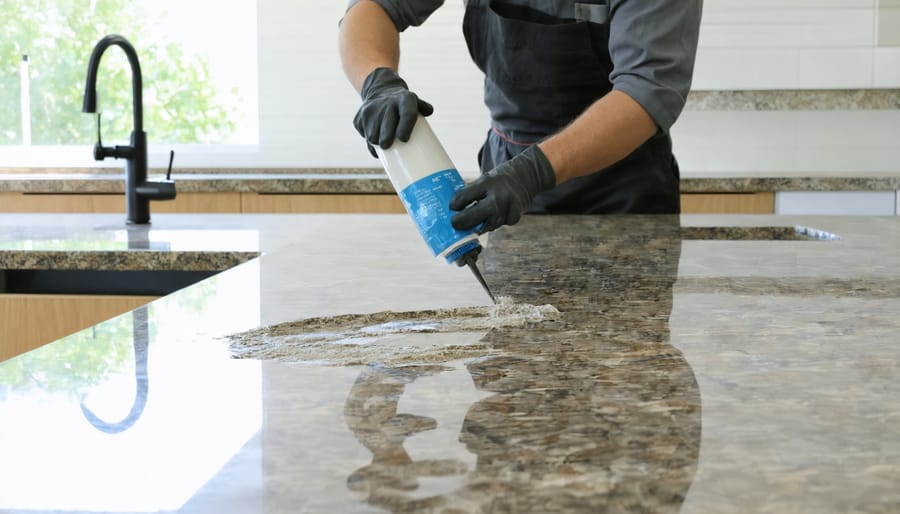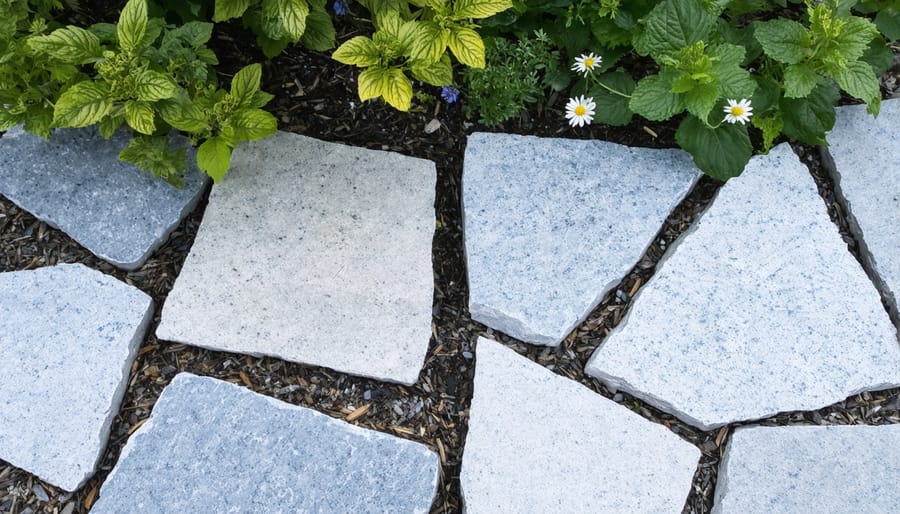Transform your kitchen into an environmental sanctuary with eco-friendly countertop options that combine stunning aesthetics with sustainable practices. Today’s innovative materials – from recycled glass and reclaimed wood to bio-based resins and salvaged stone – offer durability and design excellence while significantly reducing environmental impact. Leading manufacturers now create beautiful, high-performance surfaces using up to 75% post-consumer recycled content, zero VOC emissions, and locally sourced materials that slash transportation carbon footprints.
The countertop industry’s shift toward sustainability reflects a broader understanding that kitchen design choices directly impact our planet’s health. Modern eco-friendly surfaces require less energy to produce, minimize waste through efficient manufacturing, and often outlast traditional options – making them not just environmentally responsible, but financially smart investments. Whether you’re planning a complete kitchen renovation or updating a single surface, choosing sustainable countertops represents a powerful way to align your home’s functionality with environmental stewardship.
What Makes Granite Countertops Sustainable?
Natural Formation and Minimal Processing
Granite forms deep within the Earth’s crust over millions of years, created through the natural cooling and crystallization of molten rock. This slow geological process results in dense, durable stone that requires minimal processing to transform into beautiful countertops. Unlike engineered materials that demand extensive manufacturing and chemical treatments, granite only needs extraction and finishing to become installation-ready.
The processing of granite primarily involves cutting, shaping, and polishing – mechanical processes that consume significantly less energy compared to manufacturing synthetic alternatives. Modern quarrying techniques have become increasingly efficient, with advanced diamond-wire cutting methods reducing waste and energy consumption. Once extracted, the stone is cut into slabs using water-cooled gang saws, which minimize dust and reduce the need for chemical treatments.
This natural formation and straightforward processing make granite an environmentally conscious choice for countertops. The stone’s durability ensures a long lifespan, reducing the need for replacement and further decreasing its environmental impact. Additionally, many quarries now implement sustainable practices, including water recycling systems and habitat restoration programs, making granite an even more eco-friendly option.
Durability and Longevity
Granite’s exceptional durability makes it one of the most sustainable countertop choices available. With proper care, a granite countertop can last 50 years or more, significantly reducing the environmental impact associated with frequent replacements. This longevity means fewer resources are consumed over time, as homeowners won’t need to manufacture, transport, and install new countertops every decade.
The natural hardness and resistance to scratches, heat, and daily wear ensure that granite maintains its appearance and functionality for generations. Unlike synthetic materials that may need replacement due to degradation or changing trends, granite’s timeless appeal and robust composition contribute to its sustainability credentials.
When comparing lifecycle assessments, granite’s long service life offsets its initial environmental impact from quarrying and transportation. The material requires minimal maintenance beyond regular sealing, using environmentally friendly sealants, which further extends its lifespan while maintaining its eco-friendly qualities. This combination of durability and low maintenance requirements makes granite a responsible choice for environmentally conscious consumers looking to minimize their long-term environmental footprint.

Eco-Friendly Granite Sourcing Practices
Local vs. Imported Stone
The environmental impact of stone countertops extends far beyond just the quarrying process, with transportation playing a crucial role in their overall carbon footprint. Local stone, sourced from nearby quarries, typically travels less than 100 miles to reach fabrication facilities, significantly reducing fuel consumption and transportation-related emissions. In contrast, imported stone often travels thousands of miles by sea and land, contributing substantially to greenhouse gas emissions.
Choosing locally sourced granite not only reduces environmental impact but also supports regional economies and ensures better quality control. Local suppliers can often provide detailed information about their quarrying practices and environmental standards, offering greater transparency in the sourcing process. Additionally, working with local suppliers usually means faster delivery times and more flexible customization options.
Many regions in North America have excellent granite deposits, making it unnecessary to import stone from overseas. For example, granite quarries in Vermont, Georgia, and South Dakota produce high-quality stone that rivals imported varieties. Local stone often comes with certificates of origin and sustainability credentials that verify its environmental impact.
When selecting stone for your countertops, consider requesting documentation about the stone’s origin and transportation methods. This information can help you make an informed decision about the environmental impact of your choice while potentially reducing costs associated with long-distance shipping.
Certified Sustainable Quarries
Sustainable quarrying practices have become increasingly important in the natural stone industry, with several certification programs now available to ensure environmental responsibility. When choosing quality stone, look for materials sourced from quarries certified by recognized organizations such as the Natural Stone Council (NSC) or the International Organization for Standardization (ISO).
These certified quarries must meet strict environmental standards, including responsible land management, water conservation, and waste reduction practices. They typically implement advanced extraction techniques that minimize environmental impact while maintaining the quality of the stone. Many certified quarries also engage in land reclamation projects, ensuring that exhausted quarry sites are restored to their natural state or repurposed for beneficial use.
Key certification criteria often include:
• Efficient resource utilization and energy management
• Proper handling and disposal of quarrying byproducts
• Protection of local ecosystems and biodiversity
• Worker safety and community relations
• Transportation efficiency and carbon footprint reduction
Leading sustainable quarries also invest in modern equipment and technologies that reduce noise pollution and dust emissions while maximizing material yield. Many maintain detailed documentation of their environmental practices and undergo regular audits to maintain their certification status. When selecting stone for your countertops, requesting certification documentation helps ensure your choice supports environmentally responsible quarrying practices.
Green Installation Methods
Low-VOC Adhesives and Sealants
When installing eco-friendly countertops, the choice of adhesives and sealants plays a crucial role in maintaining the overall environmental integrity of your project. Low-VOC (Volatile Organic Compounds) adhesives and sealants significantly reduce indoor air pollution and minimize the release of harmful chemicals into the environment. These installation materials are specifically designed to complement proper installation techniques while maintaining strict environmental standards.
Modern low-VOC adhesives provide excellent bonding strength without compromising air quality. They typically contain less than 50 grams per liter of VOCs, compared to traditional adhesives that may contain up to 250 grams per liter. Similarly, eco-friendly sealants offer superior protection while being water-based rather than solvent-based, making them safer for both installers and homeowners.
Leading manufacturers now offer products that meet or exceed LEED requirements and SCAQMD regulations, ensuring compliance with green building standards. These environmentally conscious options are available in various formulations suitable for different countertop materials, including natural stone, recycled glass, and sustainable wood surfaces. While they may cost slightly more than conventional products, the long-term benefits to indoor air quality and environmental impact make them a worthwhile investment for any sustainable countertop project.
Water-Based Sealers
Water-based sealers represent the most environmentally conscious choice for protecting natural stone countertops while maintaining their eco-friendly credentials. These sealers use water as their primary carrier instead of harsh synthetic solvents, significantly reducing VOC emissions and improving indoor air quality during and after application.
Modern water-based sealers offer excellent protection against stains and moisture while allowing the stone to breathe naturally. They form a molecular bond with the stone’s surface, creating an invisible barrier that doesn’t alter the material’s natural appearance or texture. Most high-quality water-based sealers are food-safe once cured, making them ideal for kitchen countertops.
Maintenance of water-based sealers is straightforward and environmentally friendly. Regular cleaning with pH-neutral, biodegradable cleaners is sufficient to maintain the seal’s integrity. Reapplication is typically needed every 3-5 years, depending on usage and exposure, though some premium products may last longer.
When selecting a water-based sealer, look for products certified by environmental organizations and those that meet or exceed EPA standards. Many manufacturers now offer plant-based formulations that combine superior protection with minimal environmental impact, ensuring your eco-friendly countertop maintains its sustainable qualities throughout its lifetime.

Recycling and End-of-Life Considerations
Reclaimed Granite Options
Reclaimed granite offers an environmentally conscious alternative to newly quarried stone, giving existing materials a second life while maintaining the durability and beauty of natural granite. This sustainable option involves salvaging granite countertops from building demolitions, kitchen remodels, and stone yard remnants that would otherwise end up in landfills.
The benefits of choosing reclaimed granite extend beyond environmental impact. These pieces often come with unique patterns and colorations that are no longer available in current quarries, making each installation truly one-of-a-kind. Additionally, reclaimed granite is typically less expensive than new material, offering cost savings while contributing to sustainable building practices.
When sourcing reclaimed granite, work with reputable architectural salvage yards or specialized stone recyclers who can verify the material’s quality and origin. These professionals ensure the granite is properly assessed for structural integrity and cleaned before reinstallation. Many pieces can be cut and finished to suit new applications, though you may need to be flexible with sizing and design to accommodate available materials.
To maximize eco-friendliness, pair reclaimed granite with low-VOC sealants and environmentally conscious installation methods.
Repurposing Possibilities
When granite countertops reach the end of their primary use, they offer numerous creative repurposing opportunities that extend their lifecycle and reduce environmental impact. Large sections can be transformed into elegant outdoor table tops, garden benches, or decorative stepping stones for landscaping projects. Smaller pieces find new life as cutting boards, serving platters, or distinctive coasters.
In outdoor settings, recycled granite makes excellent edging for garden beds or can be crushed to create sustainable drainage material. Interior designers often repurpose granite remnants into stunning bathroom vanities, fireplace surrounds, or window sills. For the artistically inclined, granite pieces can become mosaic materials for unique wall art or decorative installations.
Commercial applications include using reclaimed granite for wall cladding, floor tiles, or reception desk surfaces. Even granite dust and small fragments, typically considered waste, can be incorporated into concrete mixtures or used as aggregate in new construction projects. These repurposing strategies not only prevent valuable material from entering landfills but also create distinctive design elements that celebrate the stone’s natural beauty in innovative ways.

Making the Sustainable Choice
Questions to Ask Your Supplier
Before selecting your eco-friendly countertop, ask your supplier these essential questions to ensure you’re making a truly sustainable choice. Begin by inquiring about the material’s source and whether they can provide documentation of environmentally responsible quarrying practices. For detailed insights, consult our comprehensive granite selection guide.
Request information about any environmental certifications the product holds, such as GREENGUARD or NSF certification. Ask about the percentage of recycled content if applicable, and whether the manufacturing process involves eco-friendly practices.
Important installation-related questions should cover:
– What adhesives and sealants will be used, and are they low-VOC?
– How do they handle waste material during installation?
– Do they offer recycling services for old countertops being replaced?
– What maintenance products do they recommend that are environmentally safe?
Also inquire about the material’s expected lifespan and whether it can be recycled at the end of its use. Understanding the full lifecycle of your countertop material helps ensure your choice aligns with your environmental values. Don’t forget to ask about their local sourcing practices, as shorter transportation distances mean a lower carbon footprint.
Maintenance for Longevity
Proper maintenance is crucial for ensuring your eco-friendly granite countertops remain beautiful and functional for generations. To effectively maintain granite countertops, start with daily cleaning using a pH-neutral cleaner and soft microfiber cloth. Avoid acidic cleaners or abrasive materials that can damage the stone’s surface and compromise its seal.
Resealing your countertops every 12-18 months is essential to prevent staining and maintain their natural resistance to bacteria. Apply a high-quality, low-VOC sealer specifically designed for natural stone. This protective barrier not only extends the life of your countertops but also reduces the need for harsh cleaning chemicals.
Address spills immediately to prevent staining, particularly from acidic substances like wine, citrus juices, or vinegar. Use cutting boards to protect the surface from scratches, and always place hot pots and pans on trivets to prevent thermal shock.
By following these maintenance guidelines, your sustainable granite countertops can last for decades, making them a truly eco-conscious choice that reduces the need for replacement and minimizes environmental impact over time.
Sustainable granite countertops represent a perfect fusion of natural beauty, durability, and environmental responsibility. As we’ve explored throughout this guide, these eco-friendly surfaces offer homeowners and designers a way to create stunning spaces while minimizing environmental impact. By choosing responsibly sourced granite, supporting quarries with sustainable practices, and working with certified fabricators, you can enjoy the timeless elegance of natural stone while contributing to environmental conservation.
The benefits extend far beyond aesthetics. Sustainable granite countertops provide exceptional longevity, reducing the need for replacement and ultimately decreasing waste. Their minimal maintenance requirements and natural resistance to heat, scratches, and stains make them a practical choice for busy households. Moreover, the local sourcing options and improvements in fabrication processes have significantly reduced the carbon footprint associated with granite installation.
Looking ahead, the growing demand for sustainable building materials continues to drive innovation in the granite industry. From water recycling systems in quarries to eco-friendly sealants and installation methods, the future of sustainable granite is promising. By choosing these environmentally conscious countertops, you’re not just investing in your home’s value and beauty – you’re participating in a larger movement toward sustainable living and responsible resource management.
Remember that every sustainable choice in home design contributes to a healthier planet, and granite countertops offer an excellent opportunity to combine luxury with environmental stewardship.










